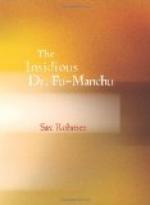I sat with my elbows upon the writing-table, my chin in my hands; Smith restlessly paced the floor, relighting his blackened briar a dozen times in as many minutes. In the big arm-chair the pseudogypsy was curled up. A brief toilet had converted the wizened old woman’s face into that of a fascinatingly pretty girl. Wildly picturesque she looked in her ragged Romany garb. She held a cigarette in her fingers and watched us through lowered lashes.
Seemingly, with true Oriental fatalism, she was quite reconciled to her fate, and ever and anon she would bestow upon me a glance from her beautiful eyes which few men, I say with confidence, could have sustained unmoved. Though I could not be blind to the emotions of that passionate Eastern soul, yet I strove not to think of them. Accomplice of an arch-murderer she might be; but she was dangerously lovely.
“That man who was with you,” said Smith, suddenly turning upon her, “was in Burma up till quite recently. He murdered a fisherman thirty miles above Prome only a mouth before I left. The D.S.P. had placed a thousand rupees on his head. Am I right?”
The girl shrugged her shoulders.
“Suppose—What then?” she asked.
“Suppose I handed you over to the police?”
suggested Smith.
But he spoke without conviction, for in the recent
past we
both had owed our lives to this girl.
“As you please,” she replied. “The police would learn nothing.”
“You do not belong to the Far East,” my friend said abruptly. “You may have Eastern blood in your veins, but you are no kin of Fu-Manchu.”
“That is true,” she admitted, and knocked the ash from her cigarette.
“Will you tell me where to find Fu-Manchu?”
She shrugged her shoulders again, glancing eloquently in my direction.
Smith walked to the door.
“I must make out my report, Petrie,” he said. “Look after the prisoner.”
And as the door closed softly behind him I knew what was expected of me; but, honestly, I shirked my responsibility. What attitude should I adopt? How should I go about my delicate task? In a quandary, I stood watching the girl whom singular circumstances saw captive in my rooms.
“You do not think we would harm you?”
I began awkwardly.
“No harm shall come to you. Why will you
not trust us?”
She raised her brilliant eyes.
“Of what avail has your protection been to some of those others,” she said; “those others whom he has sought for?”
Alas! it had been of none, and I knew it well. I thought I grasped the drift of her words.
“You mean that if you speak, Fu-Manchu will find a way of killing you?”
“Of killing me!” she flashed scornfully. “Do I seem one to fear for myself?”
“Then what do you fear?” I asked, in surprise.
She looked at me oddly.
“When I was seized and sold for a slave,” she answered slowly, “my sister was taken, too, and my brother—a child.” She spoke the word with a tender intonation, and her slight accent rendered it the more soft. “My sister died in the desert. My brother lived. Better, far better, that he had died, too.”




